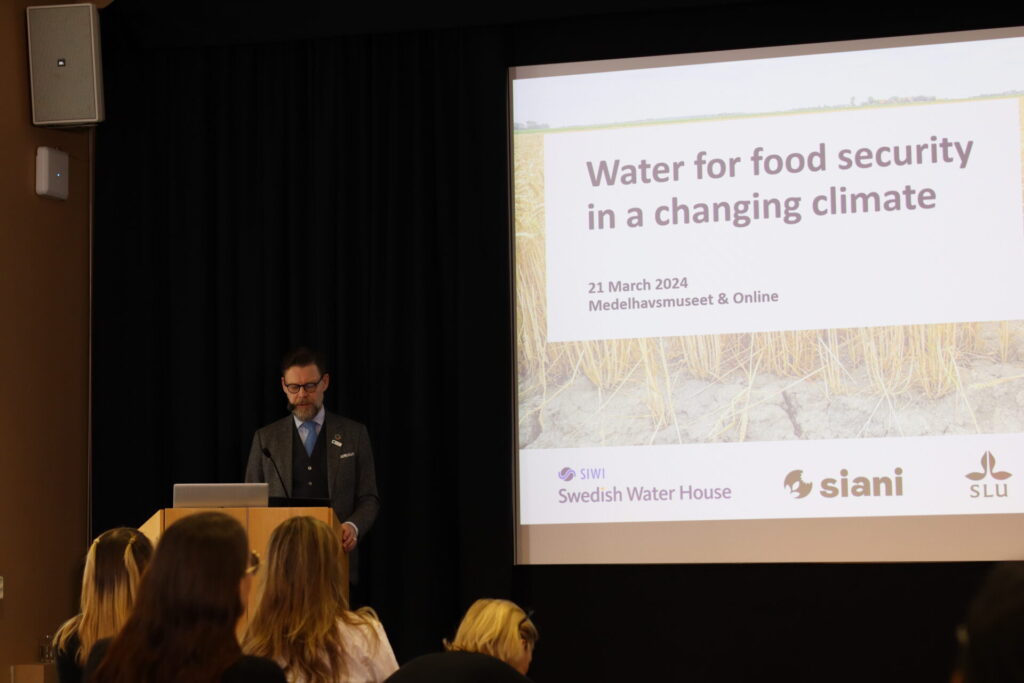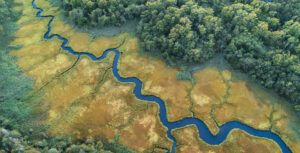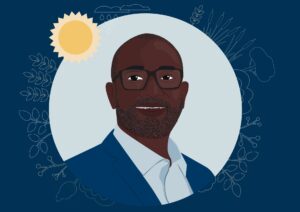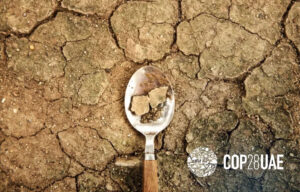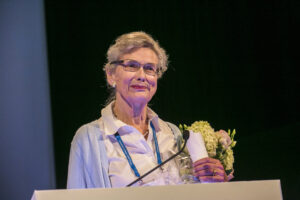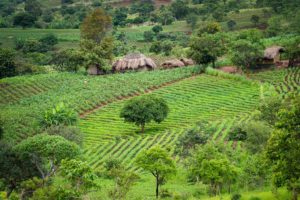Innovating water and food security
Since 2007 Swedish Water House has organized half day seminars connected to World Water Day. The seminars raise awareness of the importance of water security to different sectors and actors in Sweden and abroad. This year’s edition was held at Medelhavsmuseet in Stockholm and online and put its focus on water and food security in a changing climate. The seminar was organized by SWH together with the Swedish International Agricultural Network Initiative and SLU Global on 21 March.
Farming in Sweden depends on rainfall. This became very apparent in the summer of 2023, when a combination of droughts and extreme rains caused harvests to drop by 30 percent. Similar challenges arose in various parts of the world and affected large food exporters such as the United States (US) and India. Thomas Rebermark, Director of Swedish Water House outlined: “Climate change already impacts the water cycle, making farming more and more difficult.”
A complex challenge
Climate change is not the only challenge affecting water and food security. Estimates suggest that the world population is expected to increase to close to 10 billion people in 2050, necessitating an increase in food supplies. “This will require more water into agriculture,” explained Jennie Barron, Professor at SLU, and keynote speaker at the seminar. However, the water, biodiversity, and climate crises indicate that “we cannot really take more water into agriculture production.” The situation is further complicated by geopolitical tensions and conflicts, as well as the fact that many sectors and actors compete for water which makes related policies and legal actions more complex.
“We need to pick up the pace. [...] Farmers are willing to implement climate adaptation, but we need the economical means.”
Efforts to increase water and food security in Sweden in the face of conflicts, climate change and other crises are ongoing, but as Katarina Wolf, farmer, and president of The Federation of Swedish Farmers’ Youth section (LRF Ungdomen) pointed out: “We need to pick up the pace”. Wolf outlined how investments for an agricultural revolution are direly needed. A recent estimate for investments relating to water storage, drainage, and irrigation in Sweden were as high as 5.5 billion US dollars. Wolf emphasized that “farmers are willing to implement climate adaptation, but we need the economical means.”
Synergies between water and food systems
Despite the alarming outlook, reasons for hope exist. Strong connections between water and food give room for effective policies with multiple co-benefits for the climate and other agendas. On top of that, a high level of attention is given to water and food systems.
Practices presented at the seminar included wisdom from Indigenous Peoples, buffer zones along water ways, as well as water storage that helps to utilize methods such as irrigation without necessarily competing with natural resources. The seminar further highlighted examples from two companies, Spowdi and Sanitation 360. Spowdi uses a solar-powered drip irrigation system with economical co-benefits for smallholder farmers as well as reductions in water usage. Spowdi’s system can provide up to three times bigger harvests while significantly reducing water usage.
“There is enough nutrient in one person’s daily pee, to produce enough wheat, to make one whole loaf of bread.”
Sanitation 360 has developed a method to recycle human urine and turn it into fertilizer for agriculture. The approach is part of Sanitation 360’s mission to create a circular nutrient economy and protect water bodies and marine life from nutrification. “There is enough nutrient in one person’s daily pee, to produce enough wheat, to make one whole loaf of bread,” explained Nicola Parfitt, Project Manager at Sanitation 360.
Building on the results of the seminar, SWH will initiate a new multi-stakeholder group (MSG) on water, climate, and agriculture. SWH has since its inception in 2003 hosted about 20 MSGs that co-created new solutions and policy recommendations. SWH will invite to an initial workshop later this spring.
Join us
Are you part of a Swedish organization and interested in joining the multi-stakeholder group on water, climate, and agriculture, message: malin.wennerholm@siwi.org or Malin.ingemarsson@siwi.org
